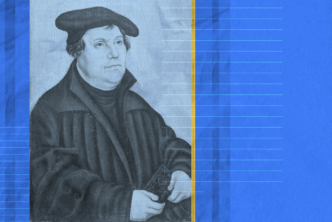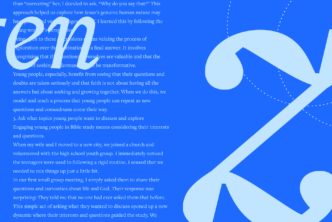According to its opening verses, the book of Proverbs was written to help you 1) know what wisdom is, 2) recognize wisdom when you see it, 3) do wise things, 4) keep growing, and 5) remain anchored in God’s Word. The wisdom of Proverbs is neither a state of maturity nor a mere body of knowledge, but a journey in the right direction—which is away from the counsels of your own heart and toward those of your Creator.
Fools journey in the opposite direction, following their hearts and refusing instruction from above. The simple are not yet either wise or foolish, but they are simply immature or inexperienced in the way of wisdom. Time will tell whether they turn one way or the other, toward God or themselves. And to do nothing is, in fact, a choice for folly, which ruins everything.
Anything that inspires you to listen to yourself instead of your Lord will prevent you from becoming wise. Of such obstacles to wisdom, the two most common to humanity are the desires for more stuff and more pleasure. But if deliverance from such obstacles, and from the terrible consequences associated with them, appeals to you, you have only to ask for wisdom. Ask for more knowledge of God—that is, for more of himself. He holds a limitless nest egg of such wisdom on deposit in heavenly storehouses, waiting only for those who fear him to request a heaping distribution.
That, in sum, is Proverbs 1–2. In this installment of Knowable Word—part 2 of 3 in Proverbs 1–9—we’ll get more personal. Lady Wisdom continues building her house (Prov 9:1), constructing a worldview one pillar at a time. Only when we move into that house, adopting her view of the world God made, will we be able to digest the feast she lays out in chapters 10–31. Our previous study of chapters 1–2 delivered the basic concepts. Now in chapters 3–4, those concepts will converge to indelibly shape our hearts. Please ask God now for wisdom. Then let’s get to it.
Week 1: Wisdom in disappointment
Unlike the pithy one-verse statements of Proverbs 10–21 or 25–29, the poetry of chapters 3 and 4 consists of sprawling sequences of stanzas making sustained arguments. Therefore, it is paramount that we observe the structure of the poetry, because by it we may discern the structure of Solomon’s argument.
Read Proverbs 3:1–12 a few times. Can you observe a distinct rhythm or structure to the poetry? How would you divide the text into stanzas (groups of verses covering the same topic or idea)? Hint: Underline or highlight every command with one color, then underline or highlight every consequence with another color. What visible pattern emerges? Which stanza is emphasized or singled out by the poem’s structure? After you’ve tried figuring it out for yourself, and if you would like more help, please see study note (A) at the end of this study.
Now direct your attention first to that emphasized stanza, as Solomon singles it out for a reason. What is the key truth contained in that stanza? What does Solomon want us to do? Why does he want us to do that? What might tempt us to disobey, or what might prevent us from obeying? How does the given rationale seek to empower obedience to the command?
The answers to those questions will shape the way we understand the rest of the stanzas. Be careful! Without the governing context of that emphasized stanza, the remaining stanzas are quite likely to be misused or abused.
Work your way through the remaining stanzas. What is the main topic being addressed? Observe carefully: What does Solomon say about the topic? What consequence will result when the command is obeyed? Even more carefully: What does Solomon not say? What assumptions should we avoid making to fill in the gaps? How should we be prepared for disappointment in each area of life when the Lord’s discipline comes to us? For more help, see study note (B) at the end of the study.
Week 2: Wisdom in satisfaction
The previous passage had a beautiful symmetry, with each of the six stanzas being exactly two verses long. The next few segments of Proverbs portray a similar beauty in their patterning. This ought not surprise us, as Solomon seeks to persuade us that God’s wisdom is attractive (see Prov 1:8–9). Since wisdom is attractive, this text about wisdom presents attractively.
Read Proverbs 3:13–26 a few times. Try to divide the text into stanzas. This time, look for shifts in the pronouns (or the subjects of sentences) to mark the stanzas. Also, a few key words (or synonyms) are repeated to mark the beginning and end of a few stanzas. Note (C) will provide some help if you’re stumped.
Notice how the first and third stanzas are parallel to one another, both in precise length and in subject matter. List all the ways those stanzas are similar. List also the ways they are different. What do those differences suggest about what Solomon seeks to argue?
What role does the central stanza play in the argument? How does the truth of that central stanza affect the truths of the outer stanzas? How would you fit these pieces together and summarize the main point of the entire poem? See note (D) for help.
How does this main idea influence your search for satisfaction in life? What will ultimately satisfy you? Why? What prevents you from finding such satisfaction? How does this poem (Prov 3:13–26) provide a helpful corollary to the disappointment discussed in the previous poem (Prov 3:1–12)?
Week 3: Wisdom and humility
Though wisdom begins with the fear of the Lord (Prov 1:7) and gains momentum through seeking and finding (Prov 2:1–8), it fully takes flight only when lived out in relationships. It’s one thing to know about the journey away from self and toward the Lord; it’s quite another to make actual decisions that will benefit others at great cost to oneself. Therefore, a heart shaped by God’s wisdom is a heart overstuffed with humility.
Read Proverbs 3:27–35 a few times. Once again, try to observe the poem’s structure. This time we have one long stanza, but the grammar suggests at least two parts. Where do you see a shift in the type of sentence, and what is that shift? For help, see note (E).
In addition to the two basic parts to the stanza, something more intricate is also going on. We can observe a number of parallels between pairs of verses. The first prohibition (27) speaks of those “to whom it is due,” and the final declaration (35) speaks of those who will “inherit” honor. The third prohibition (29) refers to the one who “dwells beside you,” and the third-to-last declaration (33) refers to the “house” of the wicked and “dwelling” of the righteous.
The fourth prohibition (30) warns us not to “contend with a man,” and the fourth-to-last declaration (32) speaks of those in the Lord’s “confidence.” These parallels are shaped in what scholars call a concentric pattern, where the outermost items make a pair, the next ones in make a pair, the next ones in make a pair, and so on.
When you line up or mark off the pairs, that which is left in the center is prominent. In this case, verse 31 underscores the rest of the material. Those on the way of wisdom will not withhold good (27–28) or plan evil (29–30) against others because they are moving toward the Lord, who takes a dim view of such behaviors (32–35).
And they recognize the temptation in their heart of hearts to envy men of violence (verse 31, the poem’s center)—those who willfully trample others on their ascent to get more stuff (see Proverbs 1:10–19). The humility of wisdom, in contrast, delights to see others benefit, even when the self does not.
Where have you seen such wisdom, expressed in selfless humility? How did the Lord Jesus embody such wisdom on our behalf?
To conclude your study of this passage, consider two New Testament passages that directly quote verse 34: James 4:6 and 1 Peter 5:5. Take a look at those passages (for context, see James 4:1–10 and 1 Peter 5:1–11) to see how the New Testament would have us apply the humility of God’s wisdom in our relationships.
Interlude: Jesus our wisdom
We’ve now spent three weeks considering how God’s wisdom ought to shape the very desires of our hearts with respect to disappointment, satisfaction, and humility. God’s wisdom will shape the way we view the world, and it will compel us to act in the interest of others more than ourselves. Such wisdom is a high calling and quite a lot to live up to. So it’s time for some good news.
When Jesus spoke about himself, and when the apostles wrote about him, they drew regularly on the Old Testament wisdom tradition to explain what the Son of God was up to. Remember, wisdom is not about how amazingly insightful you are; it is about drawing closer to your Father God. And God sent his Son for that very purpose: to draw you to himself. So that which is attributed to wisdom in the book of Proverbs is typically attributed to Jesus in the New Testament.
Take a look at the following passages and reflect on how your pursuit of the wisdom of Proverbs is really a pursuit of the Lord Jesus:
- Luke 11:29–32
- John 12:20–36
- 1 Corinthians 1:26–31
- Colossians 2:1–7
Week 4: Wisdom for life
For the next four chapters of Proverbs, Solomon signals each new poem with a direct address to “my son” or “sons.” The first three of those poems are linked by the common theme of “life” and will take up the rest of this installment of our study.
Read Proverbs 4:1–9 a few times. Where is the theme of “life” introduced, and what does Solomon have to say about it here?
The main idea of this poem is quite straightforward. Solomon is tenaciously persistent in repeating himself. What is the one thing he wants you to do above all else? In other words, what is the most important thing he wants you to spend the rest of your life doing?
Where did Solomon get this idea from? Who put it in his head? See note (F).
Have you caught this vision for wisdom? Who inspired you with such a vision? Whom will you inspire with such a vision? If you do only one thing in life, do this: Get wisdom. What can you do to get it today? Tomorrow? Next week?
What habits would you like to establish for yourself, even now, to make gaining wisdom a lifelong pursuit?
Remember the fact that wisdom is a journey in the right direction—toward the Lord. Our wisdom from God is Jesus himself (1 Cor 1:30). What habits will you establish to make your pursuit of him a lifelong endeavor?
Week 5: Wisdom and choices
Solomon continues with his theme of life, now showing us that not all roads lead to it. Read Proverbs 4:10–19 a few times. Take note of the two roads (or “ways”) before you.
What is similar about the two roads? What is different about them? According to this poem, how can we identify which road we are on?
What are you likely to find on the way of wisdom (vv. 10–13)? What are you likely to find on the way of wickedness (vv. 14–17)? What sorts of addictions are being fed on each path? What are the sedative and sustenance for pilgrims on each path?
Perhaps the evil described in this poem seems rather dramatic or exaggerated to you. Remember from Part 1 of this study that Solomon occasionally uses a literary device called caricature, where he makes his point vivid by exaggerating it as much as possible. His point is not that every person on the wrong path is this evil; his point is that everyone not on the way of wisdom is on their way to becoming this selfish.
If you think it’s not a big deal to stray from the path of wisdom, perhaps you aren’t yet aware of what you’re stumbling over (v. 19). Why, therefore, is it a big deal when people fail to make the connection between their choices and the consequences of those choices?
Proverbs 4:18 is my favorite verse in the book. What does it tell us about the nature of wisdom’s path? How quick or dramatic must your growth be to remain on the path? Which factor is more important: The size of your progress, or the direction of it? Which choices make a greater impact: your major life decisions or the (sum total of all the) small daily ones? How does this fact encourage you in your walk toward the Lord?
Week 6: Wisdom and change
If you’ve ever felt stuck in a particular conflict, situation, or set of behaviors, this week’s passage is for you. We’ve considered at length what it looks like for us to travel this path of wisdom; now we learn how wisdom travels its path in us.
Read Proverbs 4:20–27 a few times. Highlight every mention of body parts. Also, take note of the theme of “life,” observing how that life works. Which body parts does that life flow through, and in what order? See note (G) if you would like some help.
According to this passage, how does wisdom enter your life? What does this imply about wisdom’s ultimate source? How does this contradict the world’s wisdom, which persistently instructs us to “look within,” “dig deep,” or “follow your heart”? See note (H).
Where must God’s wisdom then go to plant its life within you? What does this imply about what must change before your behavior will change? How does this contradict the world’s wisdom, where who you are in private is of little consequence as long as you behave well in public? See note (I).
From that source within us, where will the wisdom then seep? What does this imply about which parts of your life will be affected? How does this contradict the world’s wisdom, which says your behaviors don’t matter unless they happen to hurt other people? See note (J).
Where would you like to experience change in your life? How does your hope in Jesus inspire you to expect such change?
Study notes
(A) Proverbs 3:1–12 consists of six stanzas; each stanza is two verses long (3:1–2, 3–4, 5–6, 7–8, 9–10, 11–12). The first five stanzas each have a command (or group of commands) followed by a consequence. The sixth stanza alters the pattern: Where we expect a consequence to follow the commands, we find a rationale or reason (v. 12) instead. That alteration, plus the repetition of the address to “my son” in verse 11 (repeated from v. 1), draws special attention to that sixth stanza.
(B) The first five stanzas address human longevity (3:1–2), relationships (vv. 3–4), guidance (vv. 5–6), health (vv. 7–8), and finances (vv. 9–10). The assured consequences are much bigger, however, than present physical health and wealth. For example, verse 10 does not promise more money or economic security; it promises contentment with what you have (you will perceive the contents of your barns and vats to be “plenty” and “bursting”). In addition, each stanza must be interpreted in light of verses 11–12, which remind us of Yahweh’s discipline and reproof, always demonstrating his fatherhood. As sons and daughters, we will not always get what we want, but what he wants for us. Such disappointment is often the way of his wisdom.
(C) “Blessed”1 is repeated in verses 13 and 18 to mark off a unit (stanza). The subject of those six verses is the blessing on the one who finds wisdom. Similarly, “keep” is repeated in verses 21 and 262 to mark the beginning and end of another stanza. The subject of those six verses is the blessing on the one who keeps wisdom. Verses 19–20 stand apart as a separate, central stanza, whose subject is Yahweh, who built his wisdom right into the created order.
(D) One way to state the main point: God designed his world to work in such a way that tremendous blessings are available to those who both find and keep wisdom.
(E) Proverbs 3:27–35 consists of five consecutive sentences that are prohibitions (or negative imperatives): “Do not.” Then there are four indicative sentences (simple declarations) that give the reason or motivation for the prohibitions (note the “for” at the start of verse 32).
(F) According to Proverbs 4:3–9, we should understand that Solomon’s choice to ask for wisdom—when God, in 1 Kings 3:5–9, invites him to ask for anything—was not a random flash of inspiration. He simply did what his daddy had trained him to do all along.
(G) I summarize the pathway of life in this passage with the following formula: Wisdom comes in the ears, through the heart, and out the fingertips. Though “fingertips” are not one of the body parts explicitly mentioned, I find fingertips to be a helpful overarching metaphor for the speech, eyes, and feet mentioned in verses 24–27.
(H) Wisdom coming “in the ears” (v. 20) means it must come from outside us, ultimately from the Lord.
(I) Wisdom coming “through the heart” (vv. 21–23) means it must change who we are on the inside—our perceptions, beliefs, values, and desires.
(J) Wisdom coming “out the fingertips” (vv. 24–27) means it will then affect everything we do. This is when we witness real change in behavior.

***
This article was originally published in the September/October 2021 issue of Bible Study Magazine. Slight adjustments, such as title and subheadings, may be the addition of an editor.
Related articles
- A Journey in the Right Direction: Proverbs (Part 1)
- Proverbs: A Plan to Stay the Course for Life (Part 3)
- 9 Commentaries on Wisdom Literature (& Why It Matters)
- What Does It Mean to Walk in Wisdom?
Related resources
Taking God At His Word: Why the Bible Is Knowable, Necessary, and Enough, and What That Means for You and Me
Regular price: $13.99
Walking in God’s Wisdom: The Book of Proverbs (Transformative Word)
Regular price: $9.99
- I am using the ESV, but these repetitions are typically present in any formal (sometimes called “literal”) Bible translation.
- The Hebrew text uses two synonyms here and doesn’t repeat the same word. Therefore, some translations, such as the CSB, likewise use English synonyms such as “maintain” and “keep.”






